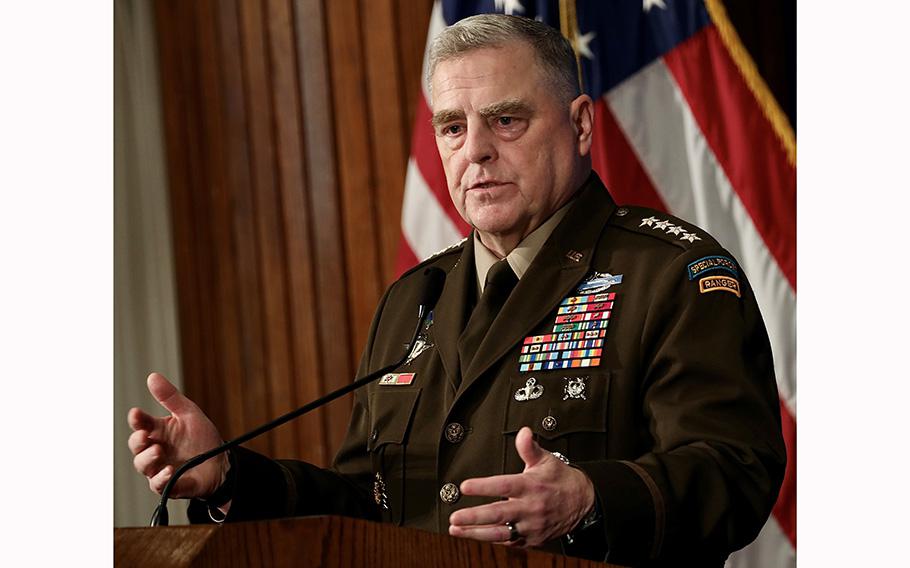
Army Gen. Mark Milley, chairman of the Joint Chiefs of Staff, speaks at the National Press Club in Washington, D.C., on Friday, June 30, 2023. (Joe Gromelski/Special to Stars and Stripes)
WASHINGTON – Army Gen. Mark Milley, who will retire as chairman of the Joint Chiefs of Staff in three months, said Friday that the U.S. military should pick up the pace on modernizing its forces so it will be able to withstand the changing conditions of future battles.
“The battlefield of the future will require rapid and constant movement and the ability to remain small and relatively invisible just to survive,” Milley said at the National Press Club in Washington. “Our task is for our military to maintain our current decisive advantage … by optimizing [new] technologies.”
Milley, 65, who has been chairman of the Joint Chiefs since 2019, retires Sept. 30 when his term ends. Many sectors of the military are in the process of implementing new modernization plans, but Milley said he wanted to see the changes happen quicker.
“I think the United States military needs to accelerate our modernization,” he said, adding the armed forces also must understand that warfare is changing in “significant” and “radical” ways. “If we, the military, don’t adapt … then we won’t have a military that’s capable of operating in that future operating environment.”
Having served in the Army for more than four decades, Milley warned future warfare will be influenced by emerging technologies such as robotics and artificial intelligence and the military must not lag behind potential adversaries such as China.
“So, you have to prepare for that. And that’s going to require significant change,” he said.
Milley underscored China is the No. 1 challenge for the U.S. military and the Pentagon must be ready to defend against Chinese aggression in the Indo-Pacific region. China has long considered Taiwan a breakaway territory and Chinese President Xi Jinping has often expressed a desire to “unify” with the island, by force if necessary.
“[We] want to make sure that every single day President Xi wakes up and says, ‘Today’s not that day,’” Milley said. “And that’s the whole essence of deterrence.”
Russians in Ukraine
Milley said there are signs that support for Moscow’s war in Ukraine is eroding among the Russian public, particularly after the short-lived rebellion last weekend by the Wagner Group, a private mercenary group that’s been fighting in support of Russia’s military in Ukraine and other countries.
Wagner leader Yevgeny Prigozhin in a video message before the rebellion rejected Moscow’s justification for the Ukraine invasion and condemned Russia’s defense ministry, partly over previous Russian military attacks that Prigozhin said killed large numbers of his fighters.
Milley said “there are some indicators” that popular support for the war is declining, noting “a lot” of military-age men chose to flee Russia not too long ago rather than go to Ukraine to fight.
“That’s clearly an indicator,” he said. “There’s some grumbling that there’s dissention with the significant amounts of casualties … a lot of casualties that Russia has suffered.”
Retirement
Milley said he will be forced to retire by federal law on the final day of September and he’s not certain yet what Oct. 1 will look like.
“I don’t know,” he said. “This is a 24/7 job … so I literally have not had time to figure all of that out.”
“Beginning 1 October, my wife and I will turn the chapter and then we will figure it out,” he said. “But right now we don’t even know where we are going to live. I told her we can go get a tent, and I’m good with that. I’ve lived in a tent before.”
Milley joined the Army in 1980 and he’s held numerous commands during his military career, including Army chief of staff, U.S. Army Forces Command, III Corps, International Security Assistance Force and the 10th Mountain Division. He was confirmed almost unanimously by the Senate as chairman of the Joint Chiefs of Staff in July 2019 and he is expected to be succeeded by Air Force Gen. Charles Q. Brown Jr., who was nominated by President Joe Biden last month.
Milley was asked Friday whether he might one day run for political office.
“Absolutely not,” he said. “I can make contributions to my country after I retire in many, many different ways. Public office is not one of them.”